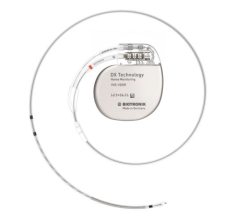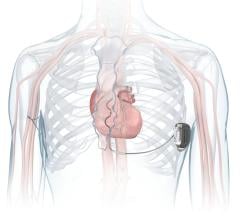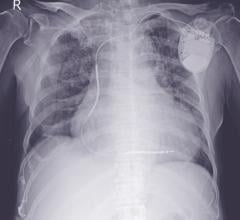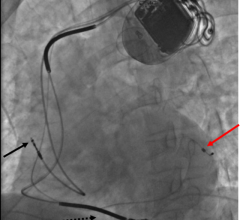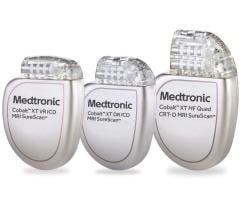
Sept. 2, 2024 – Medtronic recently shared long-term results from the global Extravascular Implantable Cardioverter Defibrillator (EV ICD) Pivotal Trial, reinforcing the performance and safety of the EV-ICD system. The results were presented at the ESC (European Society of Cardiology) Congress 2024 in London.
For more than 40 years, traditional transvenous implantable cardioverter-defibrillators (ICDs) have been saving lives by delivering lifesaving shocks or painless pacing to stop life-threatening fast or irregular heartbeats. ICDs are safe and effective for terminating life-threatening ventricular arrhythmias; transvenous leads, which run through the veins and into the heart, can result in complications. The Medtronic Aurora EV-ICD system is implanted below the left armpit with the Epsila™ defibrillation lead placed under the breastbone, helping avoid certain risks associated with transvenous ICDs.
The EV ICD Pivotal Trial is a prospective, multicenter, single-arm, non-randomized, pre-market clinical study that assessed the safety and effectiveness of the Medtronic EV-ICD system for patients at risk of sudden cardiac death. Investigators in the study enrolled 356 patients at 46 sites in 17 countries in North America, Europe, the Middle East, Asia, Australia, and New Zealand. Primary results were published in The New England Journal of Medicine.1 Previously reported safety and effectiveness results were sustained out to 18 months.2
Single Device Safely, Successfully Treats VT/VF Episodes with ATP
The final results analysis, presented by Francis Murgatroyd, MA, FRCP, Kings College Hospital, London, demonstrated that ATP was successful in 37 out of 48 episodes (77 percent), which is in line with transvenous ATP success. The EV-ICD effectively terminated VT/VF, with 100 percent shock success of discrete[*] spontaneous episodes.
Additionally, ATP utilization increased significantly through the duration of study follow-up (average 30.6 months). ATP, which is nominally OFF, was reported as programmed ON in a majority of patients (81.2 percent) at 24 months. No patient with successful ATP had the therapy programmed OFF subsequently.1 In 299 patients with a successful implant, 24 patients experienced 82 spontaneous arrhythmic episodes that were appropriately treated with either ATP only (38), shock only (34), or both (10). The EV-ICD demonstrated a low major complication rate and a high success rate for appropriate therapy, with shocks avoided in nearly half of the episodes due to the availability of ATP.
Available on all transvenous ICDs and the Medtronic Aurora EV-ICD, ATP is an effective and safe method to terminate VT, restoring the heart’s normal rhythm. It works by briefly delivering pacing pulses to the heart at a rate faster than the tachycardia.
“The final results from the EV ICD Pivotal Trial confirm the ongoing safety of the procedure and system and consolidate the benefits of the extravascular implantable cardioverter defibrillator,” said Dr. Murgatroyd. “We also now have increased evidence for the effectiveness and tolerability of anti-tachycardia pacing, rather than just shocks. This is a fundamental feature built into the extravascular ICD, which offers my patients a less painful solution, improved quality of life, and peace of mind, knowing they are protected against sudden cardiac death.”
Positive Quality of Life Benefits Reported
The EV ICD Pivotal Trial also examined patient-reported quality of life (QOL) metrics and patient acceptance of the device through a standardized, device-specific quality of life survey, the Florida Patient Acceptance Survey. EV-ICD patients reported fewer body image concerns and less device-related distress from baseline to six-month follow-up, and markedly greater overall acceptance of their ICD than subcutaneous implantable cardioverter-defibrillator (S-ICD) patients.3 The EV ICD system has displayed safety and effectiveness that persist through long-term follow-up2 and reported better quality of life compared to the existing S-ICD.3
“The final results of the EV ICD Pivotal Trial presented at ESC 2024 underscore the longer-term benefits for patients at risk of sudden cardiac death who receive a Medtronic extravascular defibrillator,” said Alan Cheng, M.D., chief medical officer of the Cardiac Rhythm Management business, which is part of the Cardiovascular Portfolio at Medtronic. “These findings highlight our commitment to continuing to create innovative products that allow physicians to provide device therapy with the advantages of transvenous defibrillators, while remaining outside the heart and vascular space.”
Medtronic is obtaining real-world performance and safety data on the commercially available Aurora EV-ICD system in the Enlighten Study, a global post-approval, prospective, non-randomized, observational, multicenter registry involving more than 125 sites. A minimum of 500 patients will be enrolled, and follow-up data will be collected through the lifetime of the device. The Aurora EV-ICD received CE (Conformité Européenne) Mark and U.S. Food and Drug Administration approval in 2023, and is now available in 29 countries around the world.
For more information on Medtronic, visit www.Medtronic.com.
* Discrete episodes are defined as less than or equal to two events within 24 hours.
1 Friedman P, et al. N Engl J Med. 2022;387:1292-1302
2 Friedman P, et al. Chronic Safety and Performance of the Extravascular ICD: Results from the Global EV ICD Pivotal Study. Presented as a Late Breaking Clinical Trial at HRS 2023. New Orleans, LA.
3 Sears SF, et al. J Cardiovasc Electrophysiol. 2024;35:240-246.


 January 13, 2026
January 13, 2026 

